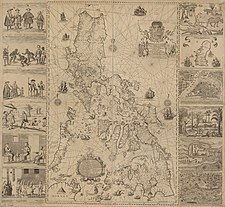
Back الاحتلال الياباني للفلبين Arabic Pagpanakop sa mga Hapones sa Pilipinas CEB تصرف فیلیپین توسط ژاپن Persian Occupation japonaise des Philippines French Pendudukan Filipina oleh Jepang ID Panangsakup ti Hapon iti Filipinas ILO 日本占領時期のフィリピン Japanese د جاپان له خوا د فلپين نيواک (اشغال) Pashto/Pushto Ocupação japonesa das Filipinas Portuguese Јапанска окупација Филипина Serbian
| History of the Philippines |
|---|
 |
| Timeline |
|
|

The Japanese occupation of the Philippines (Filipino: Pananakop ng mga Hapones sa Pilipinas; Japanese: 日本のフィリピン占領, romanized: Nihon no Firipin Senryō) occurred between 1942 and 1945, when the Japanese Empire occupied the Commonwealth of the Philippines during World War II.
The invasion of the Philippines started on 8 December 1941, ten hours after the attack on Pearl Harbor. As at Pearl Harbor, American aircraft were severely damaged in the initial Japanese attack. Lacking air cover, the American Asiatic Fleet in the Philippines withdrew to Java on 12 December 1941. General Douglas MacArthur was ordered out, leaving his men at Corregidor on the night of 11 March 1942 for Australia, 4,000 km away. The 76,000 starving and sick American and Filipino defenders in Bataan surrendered on 9 April 1942, and were forced to endure the infamous Bataan Death March on which 7,000–10,000 died or were murdered. The 13,000 survivors on Corregidor surrendered on 6 May.
Japan occupied the Philippines for over three years, until the surrender of Japan. A highly effective guerrilla campaign by Philippine resistance forces controlled sixty percent of the islands, mostly forested and mountainous areas. MacArthur supplied them by submarine and sent reinforcements and officers. The Filipino population remained generally loyal to the United States, partly because of the American guarantee of independence, because of the Japanese mistreatment of Filipinos after the surrender, and because the Japanese had pressed large numbers of Filipinos into work details and put young Filipino women into brothels.[1]
General MacArthur kept his promise to return to the Philippines on 20 October 1944. The landings on the island of Leyte were accompanied by a force of 700 vessels and 174,000 men. The initial Leyte landing was followed by landings on Mindoro, Luzon and Mindanao. During the campaign, the Imperial Japanese Army conducted a suicidal defense of the islands. Cities such as Manila were reduced to rubble. Around 500,000 Filipinos died during the occupation.[2]
- ^ "The Philippines Campaign 20 October 1944 – 15 August 1945 – World War II Multimedia Database". Archived from the original on 15 May 2011. Retrieved 22 April 2011.
- ^ Gruhl 2007, pp. 56, 143